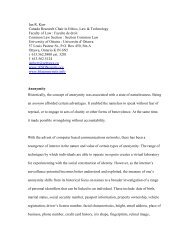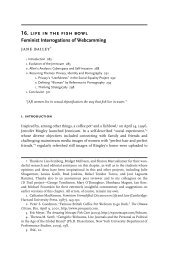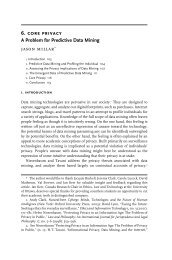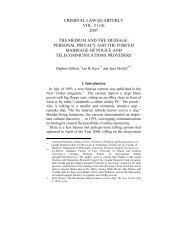Complete Cases Chart - Supreme Court of Canada - On the Identity ...
Complete Cases Chart - Supreme Court of Canada - On the Identity ...
Complete Cases Chart - Supreme Court of Canada - On the Identity ...
Create successful ePaper yourself
Turn your PDF publications into a flip-book with our unique Google optimized e-Paper software.
Case Name (<strong>Court</strong>)<br />
(Judge)<br />
Location/Method <strong>of</strong> Search Relevant Statutes Issues/Holdings<br />
- (1) whe<strong>the</strong>r <strong>the</strong> search violates s. 8 <strong>of</strong> <strong>the</strong>C<strong>Chart</strong>er? - Y/N<br />
- (2) whe<strong>the</strong>r to exclude evidence by s. 24(2)? – Y/N<br />
Reasoning<br />
- (1) relevant to s.8 + CASES (Kokesch, Plant, Hunter, Tessling, Edwards)<br />
- (2) relevant to 24(2) + CASES (Collins)<br />
Patterson v. British<br />
Columbia (Attorney<br />
General)<br />
1999 BCCA 645<br />
Holllinrake J.A.;<br />
Southin J.A. (con);<br />
Ryan J.A. (dis).<br />
*Final Level<br />
<strong>Identity</strong>/Search <strong>of</strong><br />
Person; Records<br />
R. v. Sharpe<br />
1999 BCCA 416<br />
Southin J.A.; Rowles<br />
J.A. (con); McEachern<br />
J.A. (dis).<br />
* Reversed SCC<br />
(6:3 upheld <strong>the</strong> law<br />
but read down <strong>the</strong><br />
section)<br />
Property search –<br />
Home (perimeter<br />
search)<br />
- As a condition <strong>of</strong> receiving<br />
income assistance, it is <strong>the</strong><br />
practice <strong>of</strong> <strong>the</strong> respondent<br />
government to require people<br />
to provide <strong>the</strong> Ministry <strong>of</strong><br />
Social Development and<br />
Economic Security with<br />
information regarding <strong>the</strong>ir<br />
identity, address, assets,<br />
sources and amounts <strong>of</strong><br />
income, and cost <strong>of</strong> shelter.<br />
- Patterson and <strong>the</strong><br />
Marginalized Workers Action<br />
League appeal a decision<br />
dismissing <strong>the</strong>ir challenge <strong>of</strong><br />
<strong>the</strong> requirement.<br />
- Police conducted a<br />
warranted search <strong>of</strong> <strong>the</strong><br />
accused’s home and seized a<br />
collection <strong>of</strong> materials<br />
alleged to be pornographic.<br />
- B.C. Benefits (Income<br />
Assistance) Act, ss. 3,<br />
8(1)(a), 8(1)(b), 8(1)(c),<br />
8(3)(a), 8(3)(b), 19(2) (a),<br />
19(2)(b), 24(2)(e),<br />
24(2)(k);<br />
- <strong>Chart</strong>er, ss. 1, 7, 8;<br />
- Income Assistance<br />
Regulation, B.C.<br />
Regulation 75/97, ss. 1,<br />
2(1)(a)(ii).<br />
- <strong>Chart</strong>er s. 2(b), s.8, s.1;<br />
- Criminal Code,<br />
s.163.1(4).<br />
- (1) Does requiring this personal information<br />
as a condition <strong>of</strong> receiving income assistance<br />
violate s. 8 <strong>of</strong> <strong>the</strong> <strong>Chart</strong>er?<br />
• NO<br />
- (1) Do <strong>the</strong> provisions <strong>of</strong> <strong>the</strong> Criminal Code<br />
prohibiting <strong>the</strong> private possession <strong>of</strong><br />
expressive materials (child pornography)<br />
violate <strong>the</strong> <strong>Chart</strong>er?<br />
• YES<br />
(1) Mandatory consent was necessarily incidental to achieving <strong>the</strong> purpose <strong>of</strong><br />
ascertaining eligibility for benefits.<br />
• Limitations on <strong>the</strong> form <strong>of</strong> consent ensured that no <strong>Chart</strong>er right was breached, as<br />
<strong>the</strong> consent was only to verify information. Outside agencies could release<br />
information only if it was relevant to eligibility for assistance.<br />
• The information was said to be contained and did not go beyond <strong>the</strong> agency<br />
• Therefore <strong>the</strong>re was no breach <strong>of</strong> s. 8.<br />
- Ref. to Plant (core biographical information).<br />
- Ref. to Hunter (purpose <strong>of</strong> s. 8).<br />
- The section infringes s.2(b) and cannot be saved under s.1 because it is overly<br />
broad and fails <strong>the</strong> proportionality test.<br />
- Southin: A significant value underlying <strong>the</strong> <strong>Chart</strong>er is a reasonable expectation <strong>of</strong><br />
privacy and case law concerning freedom <strong>of</strong> expression reflects <strong>the</strong> <strong>Chart</strong>er’s<br />
concern about privacy (particularly in <strong>the</strong> home or in private conversation).<br />
Detrimental effects to freedom <strong>of</strong> expression and <strong>the</strong> right to privacy substantially<br />
outweigh salutary effects.<br />
- Rowles: Concurs that <strong>the</strong> appeal should be dismissed and speaks in general terms<br />
about <strong>the</strong> importance and value <strong>of</strong> privacy enshrined in <strong>the</strong> <strong>Chart</strong>er as a backdrop to<br />
determining whe<strong>the</strong>r or not <strong>the</strong> impugned section is minimally impairing under s.1.<br />
- McEachern (dis): S.8 is a specific guarantee against unreasonable search and<br />
seizure. Searches and seizures conducted under warrant could only be at issue if<br />
conducted under an invalid law. Privacy is an important factor when considering <strong>the</strong><br />
overbreadth <strong>of</strong> legislation (particularly in <strong>the</strong> home and in private papers).<br />
R. v. Connors<br />
1998 CanLII 12468<br />
(BC C.A.)<br />
Cummings J.A.;<br />
Donald and Newbury<br />
JJ.A. (con).<br />
* Final Level<br />
- Prior to laying a drunkdriving<br />
charge, police<br />
fingerprinted <strong>the</strong> accused<br />
while in custody.<br />
- The accused was<br />
subsequently convicted.<br />
- His fingerprints were later<br />
used in ano<strong>the</strong>r case to<br />
- <strong>Chart</strong>er, s.8, 9 and 24(2);<br />
- Identification <strong>of</strong><br />
Criminals Act (ICA);<br />
Criminal Code ss. 501 and<br />
509.<br />
(1) Did fingerprinting <strong>the</strong> accused before<br />
charging him violate s.8?<br />
• NO<br />
(2) Should <strong>the</strong> evidence be excluded under<br />
24(2)?<br />
(1) The taking <strong>of</strong> fingerprints is, at common law, an incident to lawful arrest and not<br />
displaced by ICA (Cummings).<br />
• The accused consented to having fingerprints taken and <strong>the</strong>re was <strong>the</strong>refore no<br />
violation <strong>of</strong> s.8. Donald disagrees with Cumming’s statement <strong>of</strong> common law<br />
power and notes <strong>the</strong> implications for informational privacy.<br />
• Newbury generally concurs with Cummings except with respect to <strong>the</strong> status <strong>of</strong><br />
<strong>the</strong> ICA, which has displaced common law.<br />
32







